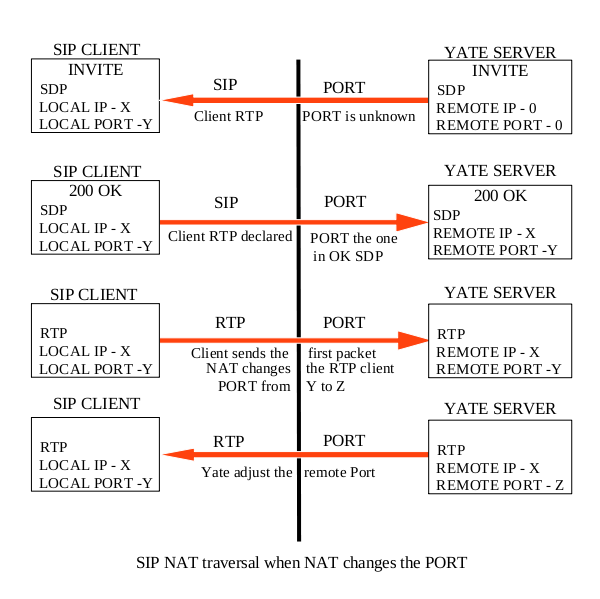SIP NAT
From Yate Documentation
(Difference between revisions)
| (10 intermediate revisions by 2 users not shown) | |||
| Line 1: | Line 1: | ||
| − | In order to solve the common problems with lossing voice when passing through NAT YATE uses the RTP stream IP+Port instead of the RTP IP+Port declared in SDP in 200 OK | + | In order to solve the common problems with lossing voice when passing through NAT, YATE uses the RTP stream's IP+Port instead of the RTP IP+Port declared in SDP in the ''200 OK'' response. |
| + | This small hack allows most of the SIP CLIENTS when Yate is the SERVER to pass the voice over NAT. | ||
| + | |||
| + | A better explanation can be found at: http://freshmeat.net/articles/view/2079/ | ||
[[File:SIP_NAT.png]] | [[File:SIP_NAT.png]] | ||
| − | + | '''See also''' | |
| + | |||
| + | * [http://freshmeat.net/articles/view/2079/ NAT traversal for the SIP protocol] | ||
| + | * [[SIP_in_Yate#SIP_with_NAT_in_Yate|SIP with NAT in Yate]] | ||
| + | * [[Telephony]] | ||
| + | |||
| + | [[Category:SIP]] [[Category:NAT]] [[Category:Server]] | ||
Latest revision as of 11:04, 4 November 2013
In order to solve the common problems with lossing voice when passing through NAT, YATE uses the RTP stream's IP+Port instead of the RTP IP+Port declared in SDP in the 200 OK response.
This small hack allows most of the SIP CLIENTS when Yate is the SERVER to pass the voice over NAT.
A better explanation can be found at: http://freshmeat.net/articles/view/2079/
See also
